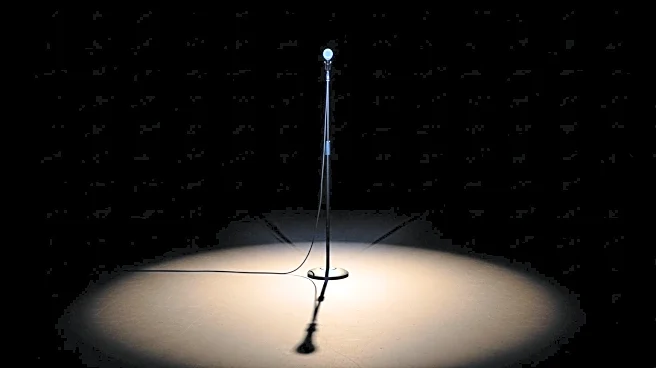What's Happening?
Comedian David Cross has publicly criticized fellow comedians for participating in the Riyadh Comedy Festival in Saudi Arabia. On September 29, 2025, Cross released a statement on his website expressing his disappointment and disgust towards those who chose to perform at the event. His remarks quickly gained traction, being reported by major outlets like Variety and sparking a cultural debate among comedians, fans, and rights groups. The festival, which features 11 U.S. comedians, has become a focal point for discussions about the ethical implications of performing in a country with a controversial human rights record. Cross's statement has led to polarized reactions within the comedy community, with some supporting his stance as a necessary moral stand, while others view it as an attack on artistic freedom.
Why It's Important?
The controversy surrounding the Riyadh Comedy Festival highlights the ongoing debate about the intersection of art and ethics. For the U.S. comedy industry, this incident could lead to significant changes in how festival contracts are negotiated, with potential clauses addressing geopolitical concerns. The backlash also underscores the broader issue of cultural engagement with countries that have contentious human rights records. Comedians and their agents may face increased pressure to consider the ethical implications of their performance venues, potentially affecting their career choices and public image. This situation also raises questions about the role of artists in advocating for human rights and the potential consequences of their participation in events linked to controversial regimes.
What's Next?
As the Riyadh Comedy Festival continues through mid-October 2025, the backlash is expected to persist, with ongoing protests and public commentary. The comedy industry may see a shift in how festival bookings are approached, with agents possibly demanding ethics clauses in contracts. This could lead to a reevaluation of the balance between artistic expression and ethical responsibility. The situation may also prompt further discussions among comedians and rights groups about the role of art in political and social advocacy. The outcome of this controversy could set a precedent for how similar situations are handled in the future, influencing the decisions of performers and event organizers alike.
Beyond the Headlines
The incident with the Riyadh Comedy Festival could have long-term implications for the comedy industry and beyond. It raises ethical questions about the responsibility of artists to consider the political and social contexts of their performances. The debate also touches on the broader issue of cultural diplomacy and the potential for art to serve as a bridge or a barrier in international relations. As the industry grapples with these questions, there may be a shift towards more conscientious decision-making regarding performance venues and collaborations. This could lead to a more nuanced understanding of the role of art in global discourse and the potential for artists to influence social change.









